小学生英语单词近义词大全
小学三年级英语同义词近义词知识点
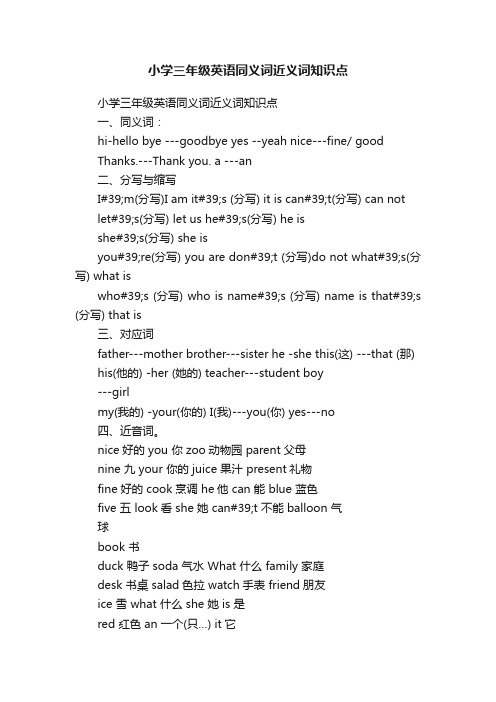
小学三年级英语同义词近义词知识点小学三年级英语同义词近义词知识点一、同义词:hi-hello bye ---goodbye yes --yeah nice---fine/ goodThanks.---Thank you. a ---an二、分写与缩写I#39;m(分写)I am it#39;s (分写) it is can#39;t(分写) can notlet#39;s(分写) let us he#39;s(分写) he isshe#39;s(分写) she isyou#39;re(分写) you are don#39;t (分写)do not what#39;s(分写) what iswho#39;s (分写) who is name#39;s (分写) name is that#39;s (分写) that is三、对应词father---mother brother---sister he -she this(这) ---that (那) his(他的) -her (她的) teacher---student boy---girlmy(我的) -your(你的) I(我)---you(你) yes---no四、近音词。
nice好的 you 你 zoo动物园 parent父母nine 九 your 你的 juice 果汁 present礼物fine好的 cook烹调 he他 can 能 blue 蓝色five 五 look看 she 她 can#39;t 不能 balloon 气球book 书duck 鸭子 soda 气水 What 什么 family 家庭desk 书桌 salad色拉 watch手表 friend朋友ice 雪 what 什么 she 她 is 是red 红色 an 一个(只…) it它read 阅读 ant蚂蚁 is 是bread 面包 and 和 it#39;s它是cat猫 ten十 lemon 柠檬hat帽子 pen 钢笔 melon 甜瓜五、同音词he#39;s他是---his他的 Oo----oh噢 Uu---you你六、复数1、直接加stable-tables book-books cat---cats goat----goats piano---pianos TV---TVs egg-eggs hat-hats2、辅音+ y 结尾,把y 改iesbaby---babies family-families3、特殊变化ox-oxen精品小编为大家提供的三年级英语同义词近义词知识点大家仔细阅读了吗?最后祝大家生活愉快。
六年级英语同义词大全
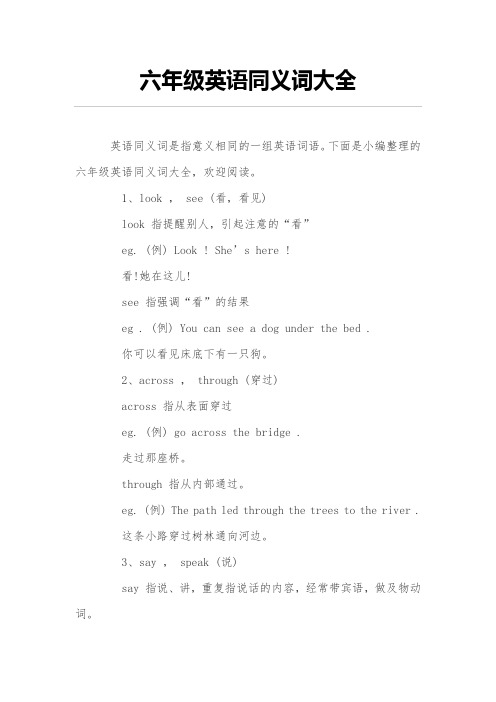
六年级英语同义词大全英语同义词是指意义相同的一组英语词语。
下面是小编整理的六年级英语同义词大全,欢迎阅读。
1、look , see (看,看见)look 指提醒别人,引起注意的“看”eg. (例) Look ! She’s here !看!她在这儿!see 指强调“看”的结果eg . (例) You can see a dog under the bed .你可以看见床底下有一只狗。
2、across , through (穿过)across 指从表面穿过eg. (例) go across the bridge .走过那座桥。
through 指从内部通过。
eg. (例) The path led through the trees to the river .这条小路穿过树林通向河边。
3、say , speak (说)say 指说、讲,重复指说话的内容,经常带宾语,做及物动词。
eg . (例) He said that he was busy .他说他很忙。
Speak 说话、演讲,着重强调说的动作,不注重说的内容,一般做不及物动词。
做及物动词时的宾语只能是语言或truth (真理、事实)eg . (例) Do you speak Chinese ?你说汉语吗?The baby is learning to speak .这孩子们在学习讲话。
4、borrow , lend (借)borrow 从主语角度讲是“借来,借进”,常为“borrow sth . From sb .”。
eg .(例) She borrowed some books from your sister .她从你姐姐那里借来了一些书。
lend 从主语的角度讲是“借出”,常为“lend sth . to sb .”或“lend sb . sth .”eg .(例) He lent me a pen .他把钢笔借给我。
5、correct , right (正确的)c orrect “正确的,恰当的”,有纠正的含义,较正式,可做动词。
小学英语反义词、近义词、对应词、同音词大全
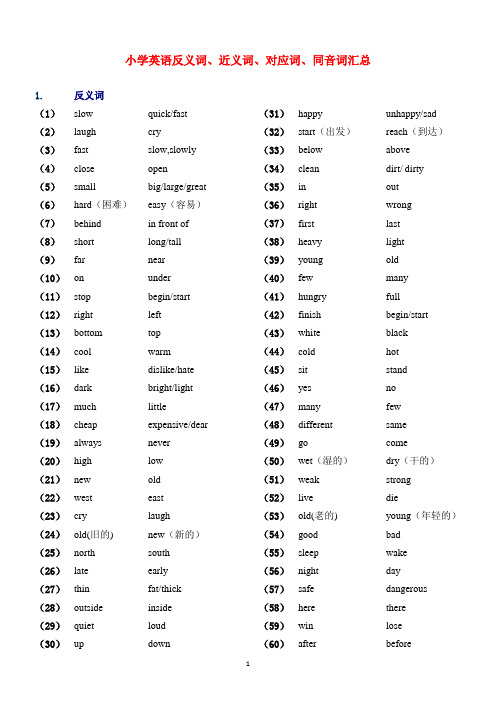
小学英语反义词、近义词、对应词、同音词汇总1. 反义词(1)slow quick/fast (31)happy unhappy/sad (2)laugh cry (32)start(出发)reach(到达)(3)fast slow,slowly (33)below above(4)close open (34)clean dirt/dirty(5)small big/large/great (35)in out(6)hard(困难)easy(容易)(36)right wrong(7)behind in front of (37)first last(8)short long/tall (38)heavy light(9)far near (39)young old(10)on under (40)few many(11)stop begin/start (41)hungry full(12)right left (42)finish begin/start (13)bottom top (43)white black(14)cool warm (44)cold hot(15)like dislike/hate (45)sit stand(16)dark bright/light (46)yes no(17)much little (47)many few(18)cheap expensive/dear (48)different same(19)always never (49)go come(20)high low (50)wet(湿的)dry(干的)(21)new old (51)weak strong(22)west east (52)live die(23)cry laugh (53)old(老的) young(年轻的)(24)old(旧的) new(新的)(54)good bad(25)north south (55)sleep wake(26)late early (56)night day(27)thin fat/thick (57)safe dangerous (28)outside inside (58)here there(29)quiet loud (59)win lose(30)up down (60)after before1(61) ask(问)answer(回答)(62) busy free(63) above below (64) all none(65) back front (66) best worst(67) danger safety (68) better worse(69) easy difficult/hard (70) dry wet/rainy (71) answer(答案) question(问题)(72) both neither(73) busy free (74) buy sell(卖)(75) strong(强壮)weak(虚弱)(76) clever foolish(77) take bring/give (78) teach learn(79) town(城镇)country(乡下)(80) whole(全部)part(部分)(81) wide(宽的)narrow(窄的)(82) with(有)without(没有)(83) earle late (84) empty(空的)full(满的)(85) fall(落下)rise(升起)(86) entrance(入口)exit(出口)(87) pain(痛苦)pleasure(快乐)(88) foreign(外国的)home(本国的)(89) forget remember (90) glad sad/sorry (91) hard(硬的)soft(软的)(92) high low(93) ill well/healthy (94) into(进入)out of(出去)(95) inside outside (96) lose find(97) lose(失败) win(胜利)(98) miss catch(99) most(最多)least/fewest (100) pass通过/及格fail(101) poor(贫穷)rich(富裕)(102) pull(拉)push(推)(103) move stop (104) never(从不)ever(曾经)(105) nothing everything (106) now(现在)then(那时)(107) slower quicker/faster (108) take off(脱下)put on(穿上)2. 同义词(1)above on (16)bike bicycle(2)father dad (17)under below(3)kid child (18)evening night(4)glad happy (19)speak talk/say(5)fast quick (20)look watch/see(6)mother mum (21)hear listen(7)below under (22)love like2(8)hello hi (23)gift present (9)plane airplane (24)laugh smile (10)much many (25)shop store (11)few little (26)hate dislike (12)small little (27)learn study (13)big large (28)dear(贵的)expensive (14)picture photo (29)begin start (15)movie film (30)faster quick(31) toilet WC (32) class lesson (33) everyone everybody (34) glass cup (35) purse wallet (36) start begin(37) home house (38) beautiful pretty(39) ususlly often (40) near beside(41) hello hi (42) garden park(43) desk table (44) river lake (45) go home come home (46) a moment ago just now (47) a lot of lots of/many (48) be good at do well in (49)sure of course (50)be from come from (51) take a walk go for a walk (52) by bus take a bus (53) would like want (54) look for find3. 对应词(1)brother sister (9)uncle aunt (2)this that (10)morning evening (3)grandfather grandmother (11)tomorrow yesterday (4)man woman (12)waitress waiter (5)daughter son (13)red green (6)mother father (14)wife husband (7)these those (15)girlfriend boyfriend (8)girl boy4. 同音词(1)sea see (7)for four3(2)meat meet (8)buy by/bye(3)sun son (9)wear where(4)to two/too (10)our hour(5) I eye (11) B be/bee(6) know no (12) C see/sea(13) hi high (14) R are(15) T tea (16) U you(17) Y why (18) right write(19) pear pair (20) hear here(21) there their (22) who’s wholse(23) red read(过去式) (24) are’t aunt(25) new knew(过去式) (26) father farther(更远的) (27) blue blew(blow的过去式) (28)4。
小学英语常用同音词、近义词、反义词归纳
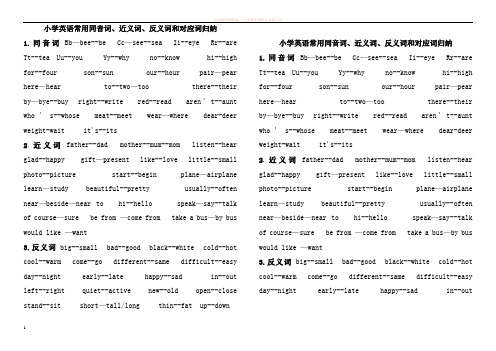
小学英语常用同音词、近义词、反义词和对应词归纳 1.同音词Bb —bee--be Cc —see--sea Ii--eye Rr--areTt--tea Uu--you Yy--why no--know hi--high for--four son--sun our--hour pair —pear here —hearto--two —toothere--their by —bye--buy right--write who ’s--whose meat--meet weight-wait it's--its2.近义词father--dad glad--happy gift —present photo--picturelearn —studybeautiful--prettynear —beside —near to of course —sure be from —would like —want3.反义词cool--warm come--go different--same difficult--easy day--night early--late happy--sad in--out left--right quiet--active new--old open--close stand--sit short —tall/long thin--fat up--down小学英语常用同音词、近义词、反义词和对应词归纳1.同音词Bb —bee--be Cc —see--sea Ii--eye Rr--are Tt--tea Uu--you Yy--why no--know hi--highfor--four son--sun our--hour pair —pearto--two —toothere--theirred--read aren ’t--aunt wear —where dear-deer mother--mum--mom listen--hear present like--love little--smallstart--beginplane —airplaneusually--oftenhi--hello speak —say--talk —come from take a bus —by bus 3.反义词big--small bad--good black--white cold--hot cool--warm come--go different--same difficult--easy day--night early--late happy--sad in--outleft--right quiet--active new--old open--close stand--sit short —tall/long thin--fat up--down wrong--right young--old behind--in front of stop —start/begin cheap--expensive/dear always--neverwest--east north--south here--there after--before4.对应词uncle--aunt grandmother —sister —brother student--teacher tomorrow —am\is —was are--were fly--fl ew make--ma d e sing--s eat--ate read--read take--took buy--bought win--w o n小学英语child--child ren man--m e n woman —foot--f ee t tooth--t ee th goose--g ee se knife--kni vesleaf--lea ves city--cit ies tomato--tomato espotato —potato es he\she\it —they him\her\it —them I —weme--us this —these that--those sheep--sheepdeer--deer Chinese--Chinese小学英语中常见不可数名词water tea juice coffee milk rain breadrice meat pork beef mutton chicken hair wrong--right young--old behind--in front of stop —start/begin cheap--expensive/dear always--neverwest--east north--south here--there after--before—grandfather father--motherson--daughter actor —actressgo--went do(does)--didd e sing--s a ng have (has)--hadsee--s a w get--g o tleave--left swim--sw a me n woman —wom e n mouse-micefoot--f ee t tooth--t ee th goose--g ee se knife--kni vesleaf--lea ves city--cit ies tomato--tomato espotato--potato es he\she\it —they him\her\it —themI —we me —us this —these that--those sheep--sheepdeer--deer Chinese--Chinese小学英语中常见不可数名词water tea juice coffee milk rain breadrice meat pork beef mutton chicken hair。
小学英语常见近义词辨析
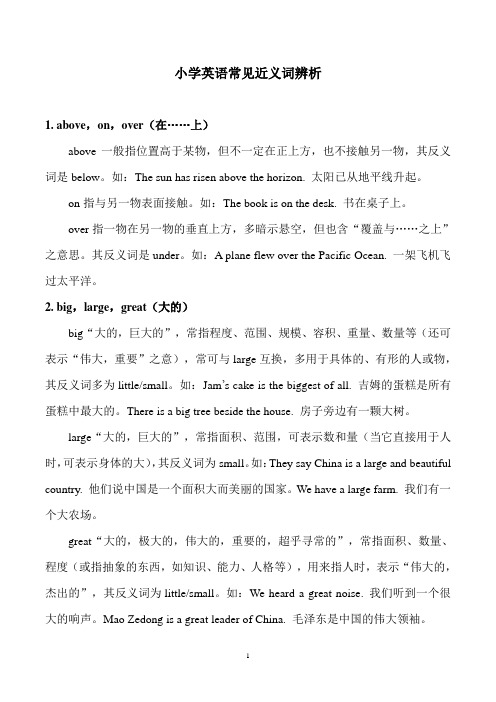
小学英语常见近义词辨析1. above,on,over(在……上)above一般指位置高于某物,但不一定在正上方,也不接触另一物,其反义词是below。
如:The sun has risen above the horizon. 太阳已从地平线升起。
on指与另一物表面接触。
如:The book is on the desk. 书在桌子上。
over指一物在另一物的垂直上方,多暗示悬空,但也含“覆盖与……之上”之意思。
其反义词是under。
如:A plane flew over the Pacific Ocean. 一架飞机飞过太平洋。
2. big,large,great(大的)big“大的,巨大的”,常指程度、范围、规模、容积、重量、数量等(还可表示“伟大,重要”之意),常可与large互换,多用于具体的、有形的人或物,其反义词多为little/small。
如:Jam’s cake is the biggest of all. 吉姆的蛋糕是所有蛋糕中最大的。
There is a big tree beside the house. 房子旁边有一颗大树。
large“大的,巨大的”,常指面积、范围,可表示数和量(当它直接用于人时,可表示身体的大),其反义词为small。
如:They say China is a large and beautiful country. 他们说中国是一个面积大而美丽的国家。
We have a large farm. 我们有一个大农场。
great“大的,极大的,伟大的,重要的,超乎寻常的”,常指面积、数量、程度(或指抽象的东西,如知识、能力、人格等),用来指人时,表示“伟大的,杰出的”,其反义词为little/small。
如:We heard a great noise. 我们听到一个很大的响声。
Mao Zedong is a great leader of China. 毛泽东是中国的伟大领袖。
小学英语常用同音词、近义词、反义词归纳
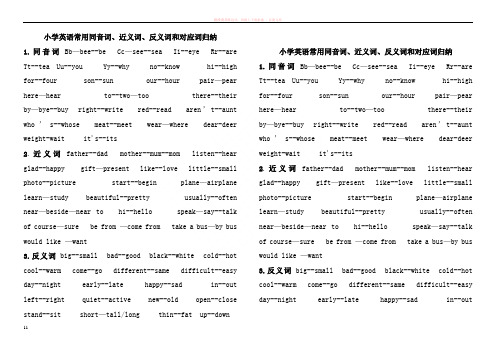
小学英语常用同音词、近义词、反义词和对应词归纳 1.同音词Bb —bee--be Cc —see--sea Ii--eye Rr--areTt--tea Uu--you Yy--why no--know hi--high for--four son--sun our--hour pair —pear here —hearto--two —toothere--their by —bye--buy right--write red--read aren ’t--aunt who ’s--whose meat--meet wear —where dear-deer weight-wait it's--its2.近义词father--dad mother--mum--mom listen--hear glad--happy gift —present like--love little--small photo--picturestart--beginplane —airplane learn —studybeautiful--prettyusually--oftennear —beside —near to hi--hello speak —say--talk of course —sure be from —come from take a bus —by bus would like —want3.反义词big--small bad--good black--white cold--hot cool--warm come--go different--same difficult--easy day--night early--late happy--sad in--out left--right quiet--active new--old open--close stand--sit short —tall/long thin--fat up--down小学英语常用同音词、近义词、反义词和对应词归纳1.同音词Bb —bee--be Cc —see--sea Ii--eye Rr--are Tt--tea Uu--you Yy--why no--know hi--highfor--four son--sun our--hour pair —pearhere —hearto--two —toothere--theirby —bye--buy right--write red--read aren ’t--aunt who ’s--whose meat--meet wear —where dear-deer weight-wait it's--its2.近义词father--dad mother--mum--mom listen--hear glad--happy gift —present like--love little--small photo--picturestart--beginplane —airplane learn —study beautiful--prettyusually--oftennear —beside —near to hi--hello speak —say--talk of course —sure be from —come from take a bus —by bus would like —want3.反义词big--small bad--good black--white cold--hot cool--warm come--go different--same difficult--easy day--night early--late happy--sad in--outleft--right quiet--active new--old open--close stand--sit short —tall/long thin--fat up--down wrong--right young--old behind--in front of stop —start/begin cheap--expensive/dear always--neverwest--east north--south here--there after--before 4.对应词this--that these--those man--woman boy--girl uncle--aunt grandmother —grandfather father--mother sister —brotherson--daughteractor —actressstudent--teacher tomorrow —yesterday小学英语常用不规则动词及过去式am\is —was are--were go--went do(does)--didfly--fl ew make--ma d e sing--s a ng have (has)--had eat--ate read--read see--s a w get--g o t take--took buy--bought leave--left swim--sw a m win--w o n小学英语一些特殊单词的复数形式child--child ren man--m e n woman —wom e n mouse-micefoot--f ee t tooth--t ee th goose--g ee se knife--kni ves leaf--lea ves city--cit ies tomato--tomato espotato —potato es he\she\it —they him\her\it —them I —we me--us this —these that--those sheep--sheep deer--deer Chinese--Chinese小学英语中常见不可数名词water tea juice coffee milk rain breadrice meat pork beef mutton chicken hair wrong--right young--old behind--in front ofstop —start/begin cheap--expensive/dear always--never west--east north--south here--there after--before 4.对应词this--that these--those man--woman boy--girl uncle--aunt grandmother —grandfather father--mother sister —brotherson--daughteractor —actressstudent--teacher tomorrow--yesterday小学英语常用不规则动词及过去式am\is —was are--were go--went do(does)--did fly--fl ew make--ma d e sing--s a ng have (has)--had eat--ate read--read see--s a w get--g o t take--took buy--bought leave--left swim--sw a m win--w o n小学英语一些特殊单词的复数形式child--child ren man--m e n woman —wom e n mouse-micefoot--f ee t tooth--t ee th goose--g ee se knife--kni ves leaf--lea ves city--cit ies tomato--tomato es potato--potato es he\she\it —they him\her\it —them I —we me —us this —these that--those sheep--sheep deer--deer Chinese--Chinese小学英语中常见不可数名词water tea juice coffee milk rain breadrice meat pork beef mutton chicken hair。
小学英语近义词大全
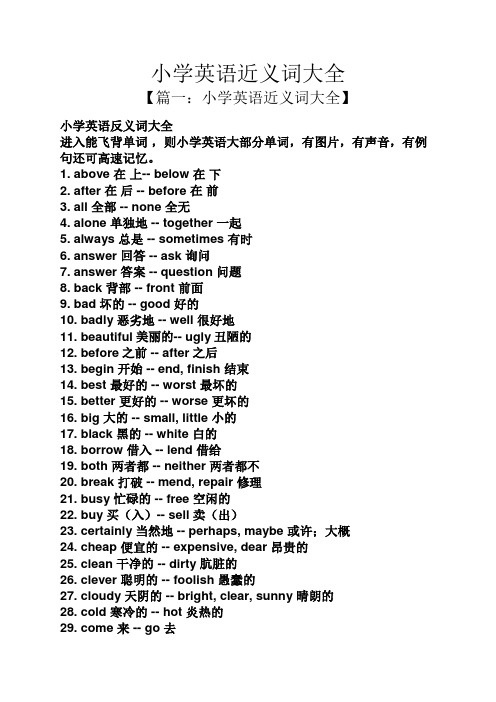
小学英语近义词大全【篇一:小学英语近义词大全】小学英语反义词大全进入能飞背单词,则小学英语大部分单词,有图片,有声音,有例句还可高速记忆。
1. above 在上-- below 在下2. after 在后 -- before 在前3. all 全部 -- none 全无4. alone 单独地 -- together 一起5. always 总是 -- sometimes 有时6. answer 回答 -- ask 询问7. answer 答案 -- question 问题8. back 背部 -- front 前面9. bad 坏的 -- good 好的10. badly 恶劣地 -- well 很好地11. beautiful美丽的-- ugly丑陋的12. before之前 -- after之后13. begin 开始 -- end, finish 结束14. best 最好的 -- worst 最坏的15. better 更好的 -- worse 更坏的16. big 大的 -- small, little 小的17. black 黑的 -- white 白的18. borrow 借入 -- lend 借给19. both 两者都 -- neither 两者都不20. break 打破 -- mend, repair 修理21. busy 忙碌的 -- free 空闲的22. buy 买(入)-- sell 卖(出)23. certainly 当然地 -- perhaps, maybe 或许;大概24. cheap 便宜的 -- expensive, dear 昂贵的25. clean 干净的 -- dirty 肮脏的26. clever 聪明的 -- foolish 愚蠢的27. cloudy 天阴的 -- bright, clear, sunny 晴朗的28. cold 寒冷的 -- hot 炎热的29. come 来 -- go 去30. cool 凉爽的 -- warm 温暖的31. danger 危险 -- safety 安全32. dark 黑暗的 -- bright, light 明亮的33. day 白天 -- night 夜晚34. dead 死的 -- alive, living 活的35. death 死亡 -- life 生命36. die 死去 -- live 活着37. down 向下 -- up 向上38. dry 干燥的 -- wet 潮湿的39. early 早的 -- late 迟的40. easy 容易的 -- difficult, hard 困难的;艰巨的41. empty 倒空 -- fill 装满42. empth 空的 -- full 满的43. entrance 入口 -- exit 出口44. fall 落下 -- rise 升起45. far 远的 -- near 近的46. fast 快-- slow 慢47. fine 晴朗的 -- cloudy, rainy 天阴的下雨的48. finish 结束 -- begin, start 开始49. first 最初的 -- last 最后的50. foreign 外国的 -- home 本国的51. forget 忘记 -- remember 记得52. freeze冰冻 -- melt融化53. from 从 -- to 到54. give 给予 -- take 拿走55. glad 愉快的 -- sad, sorry悲伤的难过的56. good 好的 -- bad, ill, poor 坏的;恶劣的57. great 伟大的 little, small 渺小的58. happy 高兴的 -- unhappy, sad 难过的59. hard 艰难的 -- easy 容易的60. hard 硬的 -- soft 软的61. hate 憎恨 -- love, like 热爱喜欢62. here 在这里 -- there 在那里63. high 高的 -- low 低的64. hold 拿住 -- drop 掉落65. holiday 假日-- weekday 工作日平时66. ill 生病的 -- healthy, well 健康的67. in 在里面 -- out 在外面68. innocent无罪的-- guilty有罪的69. inside 在里面 -- outside 在外面70. into 到里面 -- out of 从里向外71. kill 杀死 -- save 救活72. laugh 笑 -- cry 哭73. leave 离开 -- arrive 到达74. leave 离开 -- stay 逗留75. left 左-- right 右76. light 明亮的 -- dark 黑暗的77. light 轻的 -- heavy 重的78. like 喜欢 -- hate 憎恨79. like 与一样 -- unlike 与不一样80. lose 丢失 -- find 找到81. lose 失败;丢失 -- win 胜利;赢得82. many 许多 -- few 很少83. miss 未抓住未赶上 -- catch 抓住赶上84. miss 未击中 -- hit 击中85. more 更多的 -- less, fewer 更少的86. most 最多的 -- least, fewest 最少的87. move 移动 -- stop 停止88. much 许多 -- little 很少89. neat/tidy整齐的-- messy凌乱的90. never 从未 -- ever 曾经91. next 下一个--last 上一个92. nobody无一人-- everybody 每个人93. nothing什么也没有-- everything 一切94. now -- 现在 then 当时95. old 旧的 -- new 新的96. old 年老的 -- young 年轻的97. on 连续;使用中 -- off 离开;中断98. open 打开(的) -- close(d)关闭(的)99. over 在上 under 在下100. pain 痛苦 -- pleasure 快乐101. pass 通过;及格 -- fail 未通过;不及格102. poor 贫穷的 -- rich 富裕的103. pull 拉 -- push 推104. punish惩罚 -- reward奖励105. rainy 下雨的 -- dry 干旱的106. right 右边(的) -- left 左边(的)107. right 正确的 -- wrong 错误的108. safe 安全的 -- dangerous 危险的109. same 相同的 -- different 不同的110. serious严肃-- silly无聊111. short 短的 -- long 长的112. short (个子)矮的 -- tall (个子)高的113. shy害羞-- social大胆114. sleep 睡觉 -- wake 醒来115. small 小的 -- big, large, great 大的116. smooth 平滑-rough粗糙117. start 出发 -- reach 到达118. strong 强壮的 -- weak 虚弱的119. take 拿走 -- bring 带来120. take 拿取 -- give 给予121. take on穿上take off脱下122. teach 教(课) -- learn 学习123. thin 瘦的 -- fat 胖的124. thin 薄的 -- thick 厚的125. town 城镇 -- country 乡下126. true真的-- false假的127. war战争-- peace 和平128. warm温暖的 -- cool凉爽的129. whole 全体;全部 -- part 部分130. win赢-- fail输131. wide 宽的 -- narrow 窄的132. with 有 -- without 没有133. yes 是的 -- no 不是的初中英语反义词大全above 在上 below 在下after 在后 before 在前all 全部 none 全无alone 单独地 together 一起always 总是 sometimes 有时answer 回答 ask 询问answer 答案 question 问题back 背部 front 前面bad 坏的 good 好的badly 恶劣地 well 很好地begin 开始 end, finish 结束best 最好的 worst 最坏的better 更好的 worse 更坏的big 大的 small, little 小的black 黑的 white 白的borrow 借入 lend 借给both 两者都 neither 两者都不break 打破 mend, repair 修理busy 忙碌的 free 空闲的buy 买(入) sell 卖(出)certainly 当然地 perhaps, maybe 或许;大概cheap 便宜的 expensive, dear 昂贵的clean 干净的 dirty 肮脏的clever 聪明的 foolish 愚蠢的cloudy 天阴的 bright, clear, sunny 晴朗的cold 寒冷的 hot 炎热的come 来 go 去cool 凉爽的 warm 温暖的danger 危险 safety 安全dark 黑暗的 bright, light 明亮的day 白天 night 夜晚dead 死的 alive, living 活的death 死亡 life 生命die 死去 live 活着down 向下 up 向上dry 干燥的 wet 潮湿的early 早的 late 迟的easy 容易的 difficult, hard 困难的;艰巨的empty 倒空 fill 装满empth 空的 full 满的entrance 入口 exit 出口fall 落下 rise 升起far 远的 near 近的fine 晴朗的 cloudy, rainy 天阴的;下雨的finish 结束 begin, start 开始first 最初的 last 最后的foreign 外国的 home 本国的forget 忘记 remember 记得from 从 to 到give 给予 take 拿走glad 愉快的 sad, sorry 悲伤的;难过的good 好的 bad, ill, poor 坏的;恶劣的great 伟大的 little, small 渺小的happy 高兴的 unhappy, sad 难过的hard 艰难的 easy 容易的hard 硬的 soft 软的hate 憎恨 love, like 热爱;喜欢here 在这里 there 在那里high 高的 low 低的hold 拿住 drop 掉落holiday 假日 weekday 工作日;平时ill 生病的 healthy, well 健康的in 在里面 out 在外面inside 在里面 outside 在外面into 到里面 out of 从里向外kill 杀死 save 救活laugh 笑 cry 哭leave 离开 arrive 到达leave 离开 stay 逗留light 明亮的 dark 黑暗的light 轻的 heavy 重的like 喜欢 hate 憎恨like 与一样 unlike 与不一样lose 丢失 find 找到lose 失败;丢失 win 胜利;赢得many 许多 few 很少miss 未抓住;未赶上 catch 抓住;赶上miss 未击中 hit 击中more 更多的 less, fewer 更少的most 最多的 least, fewest 最少的move 移动 stop 停止much 许多 little 很少never 从未 ever 曾经next 下一个 last 上一个nobody 无一人 everybody 每个人nothing 什么也没有 everything 一切now 现在 then 当时old 旧的 new 新的 old 年老的 young 年轻的on 连续;使用中 off 离开;中断open 打开(的) close(d) 关闭(的)over 在上 under 在下pain 痛苦 pleasure 快乐pass 通过;及格 fail 未通过;不及格poor 贫穷的 rich 富裕的pull 拉 push 推quiet 寂静的 noisy 嘈杂的rainy 下雨的 dry 干旱的right 右边(的) left 左边(的)right 正确的 wrong 错误的sad 悲伤的 glad, happy 快乐的safe 安全的 dangerous 危险的same 相同的 different 不同的short 短的 long 长的short (个子)矮的 tall (个子)高的sleep 睡觉 wake 醒来slow(ly) 满的(地) quick(ly), fast 快的(地)small 小的 big, large, great 大的start 开始 end, finish 结束;停止start 出发 reach 到达【篇二:小学英语近义词大全】。
小学英语近义词、反义词、同音词、现在分词、过去式汇总
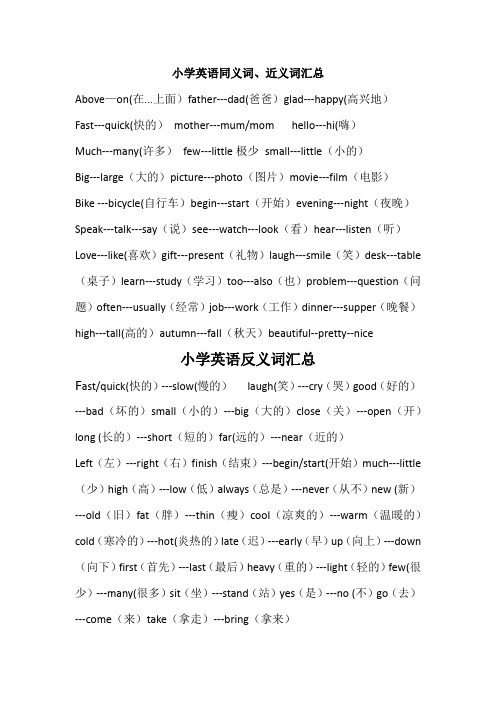
小学英语同义词、近义词汇总Above—on(在...上面)father---dad(爸爸)glad---happy(高兴地)Fast---quick(快的)mother---mum/mom hello---hi(嗨)Much---many(许多)few---little极少small---little(小的)Big---large(大的)picture---photo(图片)movie---film(电影)Bike ---bicycle(自行车)begin---start(开始)evening---night(夜晚)Speak---talk---say(说)see---watch---look(看)hear---listen(听)Love---like(喜欢)gift---present(礼物)laugh---smile(笑)desk---table (桌子)learn---study(学习)too---also(也)problem---question(问题)often---usually(经常)job---work(工作)dinner---supper(晚餐)high---tall(高的)autumn---fall(秋天)beautiful--pretty--nice小学英语反义词汇总F ast/quick(快的)---slow(慢的)laugh(笑)---cry(哭)good(好的)---bad(坏的)small(小的)---big(大的)close(关)---open(开)long (长的)---short(短的)far(远的)---near(近的)Left(左)---right(右)finish(结束)---begin/start(开始)much---little (少)high(高)---low(低)always(总是)---never(从不)new (新)---old(旧)fat(胖)---thin(瘦)cool(凉爽的)---warm(温暖的)cold(寒冷的)---hot(炎热的)late(迟)---early(早)up(向上)---down (向下)first(首先)---last(最后)heavy(重的)---light(轻的)few(很少)---many(很多)sit(坐)---stand(站)yes(是)---no (不)go(去)---come(来)take(拿走)---bring(拿来)Behind(在---后面)---in front of(在---前面)clean(干净的)---dirty (脏的)cheap(便宜的)---expensive(昂贵的)short(矮的)---tall (高的)in(在---里面)---out(在---外面)quiet(安静的)---noisy (吵闹的)outside(外面的)---inside(里面的)wrong(错误的)---right (正确的)young(年轻的)---old(年老的)after(在---后)---before (在---前)happy(高兴地)---sad(伤心的)weak(弱的)---strong (强壮的)小学英语对应词汇总These(这些)---those(那些)this(这些)---that(那些)man(男人)---woman(女人)girl(女孩)---boy(男孩)grandfather(祖父)---grandmother(祖母)grandpa(祖父)---grandma(祖母)Brother(兄弟)---sister(姐妹)uncle(叔叔)---aunt(阿姨)Here(这里)---there(那里)white(白色)---black(黑色)night(夜晚)---day(白天)小学英语同音词汇总Cc---see(看见)---sea(大海)Ii---I(我)---eye(眼睛)Rr---are(是)Tt---tea(茶)Uu---you(你们)Yy---why(为什么)aunt(阿姨)---aren’t (不是)four(四)---for(为了)where(哪里)---wear(穿)high (高的)---hi(喂)hear(听)---here(这儿)know(知道)---no(不)knew(know的过去式)---new(新的)meet(遇见)---meat(肉)hour(小时)---our(我们的)pair(一双)---pear(梨)there(那里)---their(他们的)son (儿子)---sun(太阳)Two(二)---too(也)---to(到)who’s(谁是)whose(谁的)Week(星期)---weak(虚弱的)red(红色)---read(read的过去式)right(正确的;右边)----write(书写)by(在---旁边)---bye(再见)---buy(买)it’s(它是)---its(它的)one(一)---won(win的过去式)road(道路)---rode(ride 的过去式)一、复数1. yourself(复数形式)yourselves2.knife(复数形式)knives 3.fish(复数形式)fishes 4.meat(复数形式)meat5.rice(复数形式)rice 7. bread(复数形式)bread 8. is(复数形式) are二、单数1.we(单数)I2. they(单数)he/she/it三、现在分词/ing形式1.swim/ swimming2.have/having3.make/makinge/coming5.take/taking6.boat/boating7.do/doing 8.keep/keeping 9.run/running10.rain/raining 11.climb/climbing四、过去分词/过去式1.go/went2.get/got3.see/saw4.is/was5.do/did6.are/were7.have/had 9.give/gave 10.make/made11. begin/begun。
小学生英语单词近义词大全
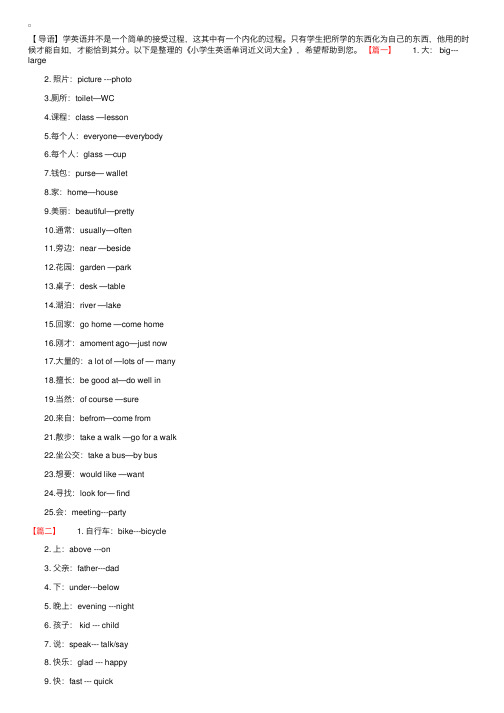
【导语】学英语并不是⼀个简单的接受过程,这其中有⼀个内化的过程。
只有学⽣把所学的东西化为⾃⼰的东西,他⽤的时候才能⾃如,才能恰到其分。
以下是整理的《⼩学⽣英语单词近义词⼤全》,希望帮助到您。
【篇⼀】 1. ⼤: big---large 2. 照⽚:picture ---photo 3.厕所:toilet—WC 4.课程:class —lesson 5.每个⼈:everyone—everybody 6.每个⼈:glass —cup 7.钱包:purse— wallet 8.家:home—house 9.美丽:beautiful—pretty 10.通常:usually—often 11.旁边:near —beside 12.花园:garden —park 13.桌⼦:desk —table 14.湖泊:river —lake 15.回家:go home —come home 16.刚才:amoment ago—just now 17.⼤量的:a lot of —lots of — many 18.擅长:be good at—do well in 19.当然:of course —sure 20.来⾃:befrom—come from 21.散步:take a walk —go for a walk 22.坐公交:take a bus—by bus 23.想要:would like —want 24.寻找:look for— find 25.会:meeting---party【篇⼆】 1. ⾃⾏车:bike---bicycle 2. 上:above ---on 3. ⽗亲:father---dad 4. 下:under---below 5. 晚上:evening ---night 6. 孩⼦: kid --- child 7. 说:speak--- talk/say 8. 快乐:glad --- happy 9. 快:fast --- quick 10. 妈妈: mother ---- mum 11. 听:hear --- listen 12. 后⾯:below --- under 13. 看:see--- watch/look 14. 快:faster--- quick 15. 你好:hello--- hi 16. 电影: movie --- film 17. 礼物:gift--- present 18. 飞机: plane--- airplane 19. 笑:laugh--- smile 20. 多:much--- many 21. 商店:Shop--- store 22. ⼩: few---little/small 23. 讨厌:hate---dislike 24. 开始:begin---start 25. 学习:learn--- study。
小学用英语单词常见同义词50组
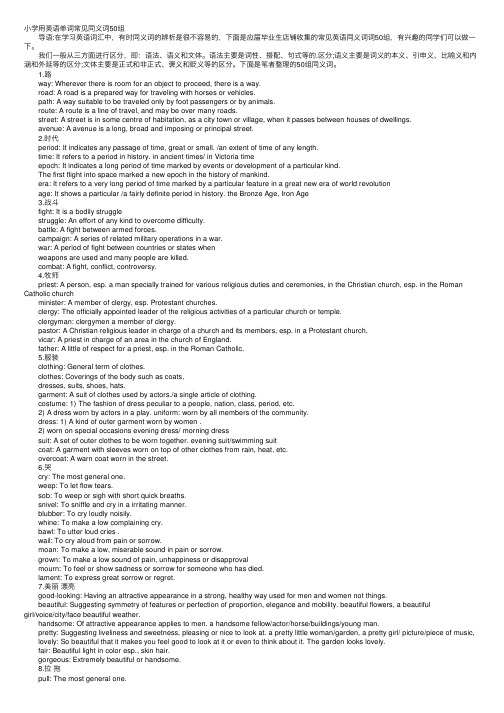
⼩学⽤英语单词常见同义词50组 导语:在学习英语词汇中,有时同义词的辨析是很不容易的,下⾯是应届毕业⽣店铺收集的常见英语同义词词50组,有兴趣的同学们可以做⼀下。
我们⼀般从三⽅⾯进⾏区分,即:语法、语义和⽂体。
语法主要是词性、搭配、句式等的.区分;语义主要是词义的本义、引申义、⽐喻义和内涵和外延等的区分;⽂体主要是正式和⾮正式、褒义和贬义等的区分。
下⾯是笔者整理的50组同义词。
1.路 way: Wherever there is room for an object to proceed, there is a way. road: A road is a prepared way for traveling with horses or vehicles. path: A way suitable to be traveled only by foot passengers or by animals. route: A route is a line of travel, and may be over many roads. street: A street is in some centre of habitation, as a city town or village, when it passes between houses of dwellings. avenue: A avenue is a long, broad and imposing or principal street. 2.时代 period: It indicates any passage of time, great or small. /an extent of time of any length. time: It refers to a period in history. in ancient times/ in Victoria time epoch: It indicates a long period of time marked by events or development of a particular kind. The first flight into space marked a new epoch in the history of mankind. era: It refers to a very long period of time marked by a particular feature in a great new era of world revolution age: It shows a particular /a fairly definite period in history. the Bronze Age, Iron Age 3.战⽃ fight: It is a bodily struggle struggle: An effort of any kind to overcome difficulty. battle: A fight between armed forces. campaign: A series of related military operations in a war. war: A period of fight between countries or states when weapons are used and many people are killed. combat: A fight, conflict, controversy. 4.牧师 priest: A person, esp. a man specially trained for various religious duties and ceremonies, in the Christian church, esp. in the Roman Catholic church minister: A member of clergy, esp. Protestant churches. clergy: The officially appointed leader of the religious activities of a particular church or temple. clergyman: clergymen a member of clergy. pastor: A Christian religious leader in charge of a church and its members, esp. in a Protestant church. vicar: A priest in charge of an area in the church of England. father: A little of respect for a priest, esp. in the Roman Catholic. 5.服装 clothing: General term of clothes. clothes: Coverings of the body such as coats, dresses, suits, shoes, hats. garment: A suit of clothes used by actors./a single article of clothing. costume: 1) The fashion of dress peculiar to a people, nation, class, period, etc. 2) A dress worn by actors in a play. uniform: worn by all members of the community. dress: 1) A kind of outer garment worn by women . 2) worn on special occasions evening dress/ morning dress suit: A set of outer clothes to be worn together. evening suit/swimming suit coat: A garment with sleeves worn on top of other clothes from rain, heat, etc. overcoat: A warn coat worn in the street. 6.哭 cry: The most general one. weep: To let flow tears. sob: To weep or sigh with short quick breaths. snivel: To sniffle and cry in a irritating manner. blubber: To cry loudly noisily. whine: To make a low complaining cry. bawl: To utter loud cries . wail: To cry aloud from pain or sorrow. moan: To make a low, miserable sound in pain or sorrow. grown: To make a low sound of pain, unhappiness or disapproval mourn: To feel or show sadness or sorrow for someone who has died. lament: To express great sorrow or regret. 7.美丽漂亮 good-looking: Having an attractive appearance in a strong, healthy way used for men and women not things. beautiful: Suggesting symmetry of features or perfection of proportion, elegance and mobility. beautiful flowers, a beautifulgirl/voice/city/face beautiful weather. handsome: Of attractive appearance applies to men. a handsome fellow/actor/horse/buildings/young man. pretty: Suggesting liveliness and sweetness, pleasing or nice to look at. a pretty little woman/garden, a pretty girl/ picture/piece of music, lovely: So beautiful that it makes you feel good to look at it or even to think about it. The garden looks lovely. fair: Beautiful light in color esp., skin hair. gorgeous: Extremely beautiful or handsome. 8.拉拖 pull: The most general one. draw: It implies a smoother, steadier motion and generally a lighter force than pull. drag: It usually refers to horizontal motion or motion up an incline and it suggests laborious efforts over rough ground or against friction, resistance or gravity. The escaped prisoner was dragged out of his hiding place. haul: It implies continuous pulling or dragging of heavy or bulky objects. The fisherman is hauling a net. tug: It applies to hard often sudden violent effort to pull. He tugged at my sleeve to ask directions. jerk: To pull suddenly. He jerked out the knife that was stuck in the wound. tow: To pull by a rope or chain. We towed the car to the nearest garage. wrench: To pull hard with a twisting or turning movement. 9.旋转 turn: The most general one. spin: To turn quickly around a central point. It emphasizes the continuity of the action, and usually the narrow extent of the circular motion. The wheel is spinning on its axis. whirl: To round very fast. It implies the lock of conscious control. The leaves whirl in the wind in the yard. rotate: To turn round a fixed point with a circular movement. The earth rotates once every 24 hours. revolve: To turn or move in a circle around a central point. It indicates circular or elliptical movement. The planets revolve around the sun. 10.⽣⽓⽓愤 anger: The most general one. be cross: Feeling easy to get angry. indignation: Anger. It stresses righteous anger at what one considers unfair, mean or shameful. We expressed our indignation at the ruthless exploitation. wrath: Very treat anger. It suggests a desire on intent to revenge or punish. rage: Wild, violent anger. It suggests loss of self- control from violence of emotion. in a rage /to fall into a rage. fury: Violent, extreme and destructive anger. She flew into a fury. 11.错误 mistake: A wrong thought, act. It implies carelessness Anyone can make a mistake. fault: A bad point, but not of a serious moral kind. It refers to behavior and character. His only fault is that he lacks ambition. find fault with sb / at fault shortcoming: Weakness, failing It refers to failures or deficiencies in things as well as people. In spite of all her shortcomings I still think she's one of the best teachers in the school. error: A mistake It implies deviation from a standard or model The accident was caused by human error. defect: sth lacking or imperfect. It refers to quality. The radio was returned because of a defect. blunder: A very stupid or unnecessary mistake. It implies ignorance. This is the fatal blunder of his life. 12.图画 picture: The most general one. painting: pictures with color. drawing: A picture made with a pen, pencil and crayon. Sketch, diagrams and graphs are all drawings. sketch: A rough not detailed drawing. diagram: A drawing, figure that shows the arrangement of something. graph: A diagram in which a straight line, curved, or zigzag line shows how two sets of numbers or measurements are related. illustration: A picture to go with words of a book. draft: The first rough written form of anything. plan: A line drawing of a building as it might been seen from above. elevation: A flat upright side of a building. chart: A map esp. a detailed map of a sea area. 13.特别 special: Different in some way from what is common, ordinary, or usual. It stresses having a quality, character, identity, or use of its own. The tube contains special gases. especial: To an usually great degree, exceptional It emphasizes the importance of the things or the persons mentioned This is a matter of especial importance. particular: Relating or belonging to only one thing or person. It stresses the distinctness of something as an individual which is worth notice. In that particular case, the rule doesn't hold. specific: Detailed and exact, clear in meaning and explanation, fixed, determined. It implies a quality or character distinguishing a kind or a species. He gave me a very specific instruction. There is a specific tool for each job. peculiar: Strange or perhaps unpleasant. It implies strangeness. He has a peculiar way of speaking. 14.取消消灭 cancel: To give up, to declare something is to be effective. He has cancelled his leave of absence. abolish: To do away with. It refers to practices, social institutions. Bad customs should be abolished. eliminate: To get rid of. We should eliminate the false and retain the true. repeal: To bring to an end of the effect of a law or an order. Some laws should be repealed. exterminate: To destroy completely and wholly. Colonialism must be exterminated. 15.破碎 break: The most general one. crush: To press together violently as to break, to destroy its shape by squeezing it. It suggests the effect of great external pressure. The tree fell on top of the car and crushed it. smash: To break thoroughly to pieces with a crushing sound. She dropped the plate and smashed it. crack: To break without separation of parts. It suggests the breaking out across a surface. He cracked the window by leaning against it. burst: To break open by pressure from within. The fireworks burst while they were in the air. shatter: To break into pieces. It suggests the breaking up of a thin surface. The glass was shattered to pieces. crash: To refer to the vehicle which hits something and is badly damaged. 16.环境形势 conditions: The location and other factors likely toaffect it. It suggests something that has stayed the same for some time and which affects daily life such as food, work, and houses. We are now studying the economic conditions in the developing countries. situation: A position or state at a particular time, set of conditions, facts, and events having an effect on a person, society, etc. It suggests more general matters such as government planning and finance. The political situation in these countries are always changing. environment: The circumstances, things and conditions that influence you. It refers to spirit aspect, physical aspect and material aspect. We must try to beautify our environment. circumstance: A situation or event around us, a certain kind of atmosphere, the conditions that affect what happens. in the circumstances surrounding: The area and environment around a place or person. It indicates a very narrow condition, physically sometimes reflects spiritual aspect. They lived in hostile surroundings. 17.著名的 well-known: famous: The most general one. widely known or honored. distinguished: Great, outstanding marked by excellent quality or deserved fame, used especially of people who are famous for serious work in science, the arts etc. He was a distinguished writer. celebrated: Famous, It refers objectively to sb or something that has been give acclaim or honoured with awards or prizes. She was a celebrated actress. renowned: Highly honored and famous for something good. often refers to places or things, also It suggests something that has become legendary or is no longer available for an objective evaluation. Edison was renowned for his inventions. noted: Well-known and admired It often describes a more intellectual kind of effort and accomplishment indicating an authority or expert or their theories. Maybe it is not widely known to the general public. He was a very noted expert. notorious: Famous for something bad. He is notorious for his crimes. 18.强盗 thief: The most general one. robber: It suggests a direct confrontation in which the owner is forced to give up his valuables. mugger: A person who attacks and robs people in a street or in a lift. burglar: A person who breaks into a house at night to steal something. gangster: A member of a group of criminals, esp. those who are armed and use guns to threaten. bandit: an armed robber. It suggests an organized group in a rural setting. brigand: A robber who lives by robbing travelers in the country. pirate: A person who robs on the sea. 19.摇动,颤动 shake: The most general one. to move up and down or back and forth.。
小学英语中的近义词
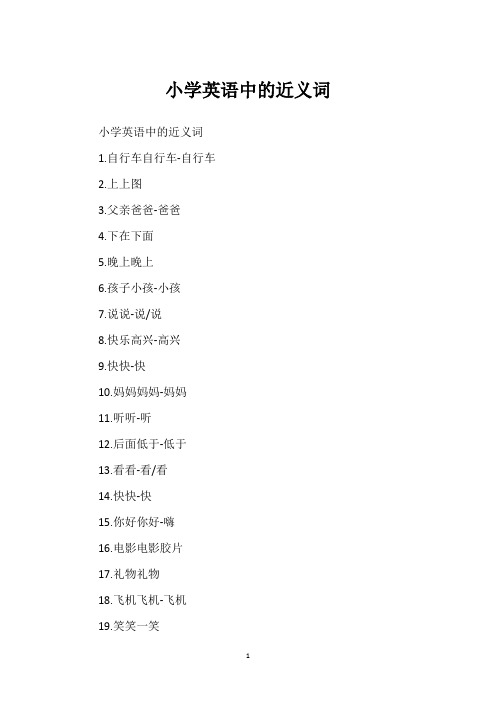
小学英语中的近义词小学英语中的近义词
1.自行车自行车-自行车
2.上上图
3.父亲爸爸-爸爸
4.下在下面
5.晚上晚上
6.孩子小孩-小孩
7.说说-说/说
8.快乐高兴-高兴
9.快快-快
10.妈妈妈妈-妈妈
11.听听-听
12.后面低于-低于
13.看看-看/看
14.快快-快
15.你好你好-嗨
16.电影电影胶片
17.礼物礼物
18.飞机飞机-飞机
19.笑笑一笑
20.多很多很多
21.商店商店
22.小很少/很少
23.讨厌讨厌-不喜欢
24.开始开始-开始
25.学习学习-学习
26.大大大的
27.照片图片-照片
28.厕所厕所——厕所
29.课程课堂——课
30.每个人每个人——每个人
31.每个人玻璃杯
32.钱包钱包
33.家家——房子
34.美丽漂亮——漂亮
35.通常通常——经常
36.旁边附近
37.花园花园——公园
38.桌子桌子
39.湖泊河流—湖泊
40.回家回家——回家
41.刚才不久前——就在刚才
42.大量的很多很多很多
43.擅长擅长——擅长
44.当然当然——当然
45.来自来自——来自
46.散步散步——去散步
47.坐公交坐公共汽车——乘公共汽车
48.想要想要——想要
49.寻找查找—查找
50.会聚会。
小学英语近义词大全

小学英语近义词大全近义词,是指词汇意义相同或相近的词语,下面小编为大家搜索整理了小学英语近义词大全,欢迎阅读借鉴。
小学英语近义词1、listen-hear2、class-lesson3、everyone-everybody4、glass-cup5、large-big6、glad-happy7、like-love8、little-small9、start-begin10、near-beside11、like-want12、for-find13、photo-picture14、hi-hello15、home—house16、learn-study17、beautiful-pretty18、usually-often19、look-see20、bicycle-bike21、quick-fast22、garden-park23、desk-table24、speak-say-talk25、be good at-do well in26、rive-lake27、go home-come home28、of course-sure29、a moment ago-just now30、a lot of-lots of-many31、take a bus –by bus32、be from-come from33、take a walk-go for a walk常见英语反义词above 在......上-- below 在......下after 在......后-- before 在......前all 全部-- none 全无answer 回答-- ask 询问answer 答案-- question 问题back 后面-- front 前面bad 坏的-- good 好的best 最好的-- worst 最坏的better 更好的-- worse 更坏的black 黑的-- white 白的both 两者都-- neither 两者都不busy 忙碌的-- free 空闲的buy 买(入)-- sell 卖(出)cheap 便宜的-- expensive, dear 昂贵的clean 干净的-- dirty 肮脏的clever 聪明的-- foolish 愚蠢的cold 寒冷的-- hot 炎热的come 来-- go 去cool 凉爽的-- warm 温暖的danger 危险-- safety 安全dark 黑暗的-- bright, light 明亮的day 白天-- night 夜晚die 死去-- live 活着down 向下-- up 向上dry 干燥的-- wet 潮湿的early 早的-- late 迟的easy 容易的-- difficult, hard 困难的;艰巨的empty 空的-- full 满的entrance 入口-- exit 出口fall 落下-- rise 升起far 远的-- near 近的finish 结束-- begin, start 开始first 最初的-- last 最后的foreign 外国的-- home 本国的forget 忘记-- remember 记得glad 愉快的-- sad, sorry 悲伤的;难过的happy 高兴的-- unhappy, sad 难过的hard 硬的-- soft 软的hate 憎恨-- love, like 热爱;喜欢here 在这里-- there 在那里high 高的-- low 低的ill 生病的-- healthy, well 健康的into 到......里面-- out of 从......到外,在......之外inside 在里面-- outside 在外面light 轻的-- heavy 重的lose 丢失-- find 找到lose 失败-- win 胜利;赢得miss 未抓住;未赶上-- catch 抓住;赶上most 最多的-- least, fewest 最少的move 移动-- stop 停止never 从不-- ever 曾经nothing 什么也没有-- everything一切now 现在-- then 那时old 旧的-- new 新的old 年老的-- young 年轻的pain 痛苦-- pleasure 快乐pass 通过;及格-- fail 未通过;不及格poor 贫穷的-- rich 富裕的pull 拉-- push 推rainy 下雨的-- dry 干旱的right 右边(的)-- left 左边(的)right 正确的-- wrong 错误的safe 安全的-- dangerous 危险的same 相同的-- different 不同的short 短的-- long 长的short (个子)矮的-- tall (个子)高的sleep 睡觉-- wake 醒来small 小的-- big, large, great 大的start 出发-- reach 到达strong 强壮的-- weak 虚弱的take 拿走-- bring 带来take 拿取-- give 给予teach 教(课)-- learn 学习thin 瘦的-- fat 胖的thin 薄的-- thick 厚的town 城镇-- country 乡下whole 全体;全部-- part 部分wide 宽的-- narrow 窄的with 有-- without 没有yes 是的-- no 不是的。
小学生英语近义词大全
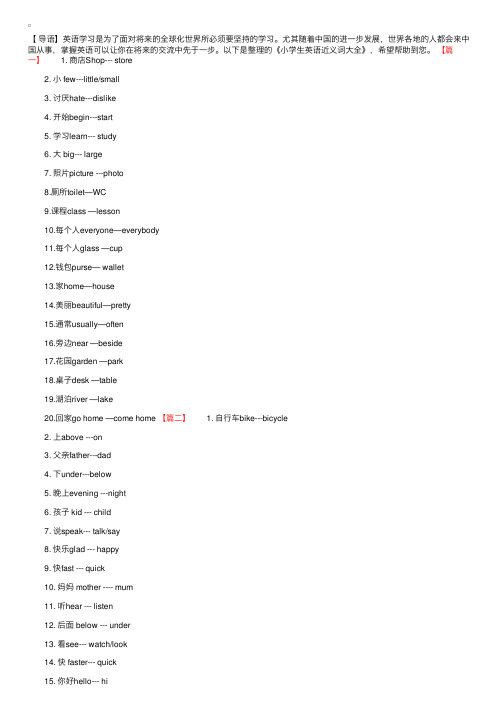
【导语】英语学习是为了⾯对将来的全球化世界所必须要坚持的学习。
尤其随着中国的进⼀步发展,世界各地的⼈都会来中国从事,掌握英语可以让你在将来的交流中先于⼀步。
以下是整理的《⼩学⽣英语近义词⼤全》,希望帮助到您。
【篇⼀】 1. 商店Shop--- store 2. ⼩ few---little/small 3. 讨厌hate---dislike 4. 开始begin---start 5. 学习learn--- study 6. ⼤ big--- large 7. 照⽚picture ---photo 8.厕所toilet—WC 9.课程class —lesson 10.每个⼈everyone—everybody 11.每个⼈glass —cup 12.钱包purse— wallet 13.家home—house 14.美丽beautiful—pretty 15.通常usually—often 16.旁边near —beside 17.花园garden —park 18.桌⼦desk —table 19.湖泊river —lake 20.回家go home —come home 【篇⼆】 1. ⾃⾏车bike---bicycle 2. 上above ---on 3. ⽗亲father---dad 4. 下under---below 5. 晚上evening ---night 6. 孩⼦ kid --- child 7. 说speak--- talk/say 8. 快乐glad --- happy 9. 快fast --- quick 10. 妈妈 mother ---- mum 11. 听hear --- listen 12. 后⾯ below --- under 13. 看see--- watch/look 14. 快 faster--- quick 15. 你好hello--- hi 16. 电影 movie --- film 17. 礼物gift--- present 18. 飞机 plane--- airplane 19. 笑laugh--- smile 20. 多much--- many。
小学英语词汇 常见的英语同义词50组
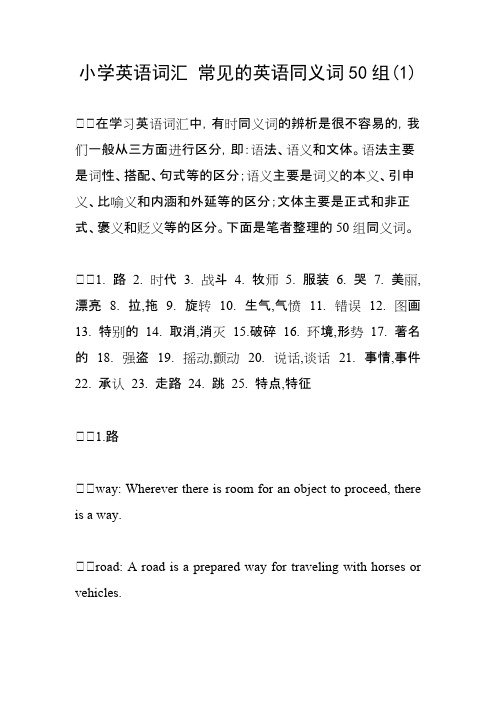
小学英语词汇常见的英语同义词50组(1) 在学习英语词汇中,有时同义词的辨析是很不容易的,我们一般从三方面进行区分,即:语法、语义和文体。
语法主要是词性、搭配、句式等的区分;语义主要是词义的本义、引申义、比喻义和内涵和外延等的区分;文体主要是正式和非正式、褒义和贬义等的区分。
下面是笔者整理的50组同义词。
1. 路2. 时代3. 战斗4. 牧师5. 服装6. 哭7. 美丽,漂亮8. 拉,拖9. 旋转10. 生气,气愤11. 错误12. 图画13. 特别的14. 取消,消灭15.破碎16. 环境,形势17. 著名的18. 强盗19. 摇动,颤动20. 说话,谈话21. 事情,事件22. 承认23. 走路24. 跳25. 特点,特征 1.路 way: Wherever there is room for an object to proceed, there is a way. road: A road is a prepared way for traveling with horses or vehicles. path: A way suitable to be traveled only by foot passengers or by animals. route: A route is a line of travel, and may be over many roads. street: A street is in some centre of habitation, as a city town or village, when it passes between houses of dwellings. avenue: A avenue is a long, broad and imposing( 壮严) or principal street. 2.时代(期) (时期) period: It indicates any passage of time, great or small. /an extent of time of any length. (时代) time(s): It refers to a period in history. in ancient times/ in Victoria time (新时代) epoch: It indicates a long period of time marked by events or development of a particular kind. The first flight into space marked a new epoch in the history of mankind. (纪元) era: It refers to a very long period of time marked by a particular feature in a great new era of world revolution (时期) age: It shows a particular /a fairly definite period in history. the Bronze Age, Iron Age 3.战斗(打仗) fight: It is a bodily struggle (奋斗斗争) struggle: An effort of any kind to overcome difficulty. (战斗) battle: A fight between armed forces. (战役) campaign: A series of related military operations in a war. (战争) war: A period of fight between countries or states when weapons are used and many people are killed. (对抗) combat: A fight, conflict, controversy. 4.牧师(教士牧师) priest: A person, esp. a man specially trained for various religious duties and ceremonies, in the Christian church, esp. in the Roman Catholic church (牧师) minister: A member of clergy, esp. Protestant churches. (牧师) clergy(pl): The officially appointed leader of thereligious activities of a particular church or temple. clergyman: clergymen(pl) a member of clergy. (牧师) pastor: A Christian religious leader in charge of a church and its members, esp. in a Protestant church. (教区牧师) vicar: A priest in charge of an area(parish) in the church of England. father: A little of respect for a priest, esp. in the Roman Catholic. 5.服装 clothing(collect): (fml) General term of clothes. clothes(no single): Coverings of the body such as coats, dresses, suits, shoes, hats. garment(fl): A suit of clothes used by actors./a single articleof clothing. costume: 1) The fashion of dress peculiar to a people, nation, class, period, etc. 2) A dress worn by actors in a play. uniform: worn by all members of the community. dress: 1) A kind of outer garment worn by women (连衣裙). 2) worn on special occasions (礼服) evening dress/ morning dress suit: A set of outer clothes to be worn together. evening suit/swimming suit coat: A garment with sleeves worn on top of other clothes from rain, heat, etc. overcoat: A warn coat worn in the street. 6.哭 cry: The most general one. (哭泣) weep: To let flow tears. (抽泣抽嗒) sob: To weep or sigh with short quick breaths. (哭天抹泪涕泪交流) snivel: To sniffle and cry in a irritating manner. (哭嚎又哭又闹) blubber: To cry loudly noisily. (发出低声报怨声) whine: To make a low complaining cry. (嚎哭) bawl: To utter loud cries (always in bad sense). (痛哭) wail: To cry aloud from pain or sorrow. (呻吟) moan: To make a low, miserable sound in pain or sorrow. (呻吟) grown: To make a low sound of pain, unhappiness ordisapproval (哀悼) mourn: To feel or show sadness or sorrow for someone who has died. (哀悼) lament: To express great sorrow or regret. 7.美丽漂亮 good-looking: Having an attractive appearance in a strong, healthy way used for men and women not things. beautiful: ( a woman or a thing) Suggesting symmetry of features or perfection of proportion, elegance and mobility. beautiful flowers, a beautiful girl/voice/city/face beautiful weather. handsome: Of attractive appearance applies to men. a handsome fellow/actor/horse/buildings/young man. pretty: (a girl, or a small thing) Suggesting liveliness and sweetness, pleasing or nice to look at. a pretty littlewoman/garden, a pretty girl/ picture/piece of music, lovely: (something) So beautiful that it makes you feel good to look at it or even to think about it. The garden looks lovely. fair: Beautiful( of woman in poet) light in color esp., skin hair. gorgeous: (persons or things) (inf) Extremely beautiful or handsome. 8.拉拖 pull: The most general one. draw: It implies a smoother, steadier motion and generally a lighter force than pull. drag: It usually refers to horizontal motion or motion up an incline (slope) and it suggests laborious efforts over rough ground or against friction, resistance or gravity. The escaped prisoner was dragged out of his hiding place. haul: It implies continuous pulling or dragging of heavy or bulky objects. The fisherman is hauling a net. tug: It applies to hard often sudden violent effort to pull. He tugged at my sleeve to ask directions. jerk: To pull suddenly. He jerked out the knife that was stuck in the wound. tow: To pull by a rope or chain. We towed the car to the nearest garage. wrench: To pull hard with a twisting or turning movement. 9.旋转turn: The most general one. (自转) spin: To turn quickly around a central point. It emphasizes the continuity of the action, and usually the narrow extent of the circular motion. The wheel is spinning on its axis. (急转) whirl: To round very fast. It implies the lock of conscious control. The leaves whirl in the wind in the yard. (转动) rotate: To turn round a fixed point with a circular movement. The earth rotates once every 24 hours. (绕转) revolve: To turn or move in a circle around a central point. It indicates circular or elliptical (椭圆) movement. The planets revolve around the sun. 10.生气气愤 anger: The most general one. (易怒) be cross: Feeling easy to get angry. (愤慨) indignation: (fml) Anger. It stresses righteous anger at what one considers unfair, mean or shameful. We expressed our indignation at the ruthless exploitation. (愤怒) wrath: Very treat anger. (literary) It suggests a desire on intent to revenge or punish. (狂怒) rage: Wild, violent anger. It suggests loss of self- control from violence of emotion. in a rage /to fall into a rage. (暴怒) fury: Violent, extreme and destructive anger. She flew into a fury. 11.错误 (误会) mistake: A wrong thought, act. It implies carelessness Anyone can make a mistake. (过错弱点) fault: A bad point, but not of a serious moral kind. It refers to behavior and character. His only fault is that he lacks ambition. find fault with sb / at fault shortcoming: Weakness, failing It refers to failures or deficiencies in things as well as people. In spite of all her shortcomings I still think she's one of the best teachers in the school. (疏忽) error: A mistake (formal sometimes literary) It implies deviation from a standard or model The accident was caused by human error. (缺点毛病) defect: sth lacking or imperfect. It refers to quality. The radio was returned because of a defect. (失误过失) blunder: A very stupid or unnecessary mistake. It implies ignorance. This is the fatal blunder of his life. 12.图画 picture: The most general one. (彩图) painting: pictures with color. (绘画图画) drawing: A picture made with a pen, pencil and crayon. Sketch, diagrams and graphs are all drawings. (草图) sketch: A rough not detailed drawing. (图解图表) diagram: A drawing, figure that shows the arrangement of something. (曲线图) graph: A diagram in which a straight line, curved, or zigzag line shows how two sets of numbers or measurements are related. (插图) illustration: A picture to go with words of a book. (图样草图) draft: The first rough written form of anything. (平面图) plan: A line drawing of a building as it might been seen from above. (主视图) elevation: A flat upright side of a building. (海图) chart: A map esp. a detailed map of a sea area. 13.特别 (专门的,与众不同的) special: Different in some way from what is common, ordinary, or usual. It stresses having a quality, character, identity, or use of its own. The tube contains special gases. (特别的) especial: (fml) To an usually great degree, exceptional It emphasizes the importance of the things or the persons mentioned This is a matter of especial importance. (各别的) particular: Relating or belonging to only one thing or person. It stresses the distinctness of something as an individual which is worth notice. In that particular case, the rule doesn't hold.(适用) (特种的) specific: Detailed and exact, clear in meaning and explanation, fixed, determined.(used in scientific articles) It implies a quality or character distinguishing a kind or a species. He gave me a very specific instruction. There is a specific tool for each job. (独特的) peculiar: Strange or perhaps unpleasant. It implies strangeness. He has a peculiar way of speaking. 14.取消消灭 (取消解除) cancel: To give up, to declare something is to be effective. He has cancelled his leave of absence.(消假) (废除废止) abolish: To do away with. It refers to practices, social institutions. Bad customs should be abolished. (消灭排除) eliminate: To get rid of. We should eliminate the false and retain the true. (撤消废除) repeal: To bring to an end of the effect of a law or an order. Some laws should be repealed. (根除消灭) exterminate: To destroy completely and wholly. Colonialism must be exterminated. 15.破碎 break: The most general one. (压碎压破) crush: To press together violently as to break, to destroy its shape by squeezing it. It suggests the effect of great external pressure. The tree fell on top of the car and crushed it. (打碎) smash: To break thoroughly to pieces with a crushing sound. She dropped the plate and smashed it. (打裂) crack: To break without separation of parts. It suggests the breaking out across a surface. He cracked the window by leaning against it. (破裂) burst: To break open by pressure from within. The fireworks burst while they were in the air. (砸碎破碎) shatter: To break into pieces. It suggests the breaking up of a thin surface. The glass was shattered to pieces. (撞坏) crash: To refer to the vehicle which hits something and is badly damaged. 16.环境形势 (环境形势) conditions: The location and other factors likely to affect it. It suggests something that has stayed the same for some time and which affects daily life such as food, work, and houses. We are now studying the economic conditions in the developing countries. (形势) situation: A position or state at a particular time, set of conditions, facts, and events having an effect on a person, society, etc. It suggests more general matters such as government planning and finance. The political situation in these countries are always changing. (环境周围外界) environment: The circumstances, things and conditions that influence you. It refers to spirit aspect, physical aspect and material aspect. We must try to beautify our environment. (形势情况) circumstance(s): A situation or event around us, a certain kind of atmosphere, the conditions that affect what happens. in (under) the circumstances (环境周围事物) surrounding(s): The area and environmentaround a place or person. It indicates a very narrow condition, "physically" sometimes reflects spiritual aspect. They lived in hostile surroundings. 17.著名的 well-known: (infl) famous: The most general one. widely known or honored. (杰出的知名的) distinguished: Great, outstanding marked by excellent quality or deserved fame, used especially of people who are famous for serious work in science, the arts etc. He was a distinguished writer. (驰名的) celebrated: Famous, (substitute for renowned) It refers objectively to sb or something that has been giveacclaim or honoured with awards or prizes. She was a celebrated actress. renowned: Highly honored and famous for something good. often refers to places or things, also It suggests something that has become legendary or is no longer available for an objective evaluation. Edison was renowned for his inventions. noted: Well-known and admired It often describes a more intellectual kind of effort and accomplishment indicating an authority or expert or their theories. Maybe it is not widely known to the general public. He was a very noted expert. (臭名昭著) notorious: Famous for something bad. He is notorious for his crimes. 18.强盗 thief: The most general one. (强盗) robber: It suggests a direct confrontation in which the owner is forced to give up his valuables. (行凶强劫) mugger: A person who attacks and robs people in a street or in a lift. burglar: A person who breaks into a house at night to steal something. (歹徒暴徒) gangster: A member of a group of criminals, esp. those who are armed and use guns to threaten. (匪徒) bandit: an armed robber. It suggests an organized group in a rural setting. (土匪) brigand: A robber who lives by robbing travelers in the country. (海盗) pirate: A person who robs on the sea. 19.摇动,颤动 shake: The most general one. to move up and down or back and forth. It refers to persons or things. (发抖) quiver: To tremble a little. It suggests a rapid but invisible vibration. His lips quivered with emotion. (颤抖) tremble: To shake uncontrollably and slightly as from fear, cold, excitement etc. It implies uneasiness and nervousness. Her voice trembled as she began to sing. (瞬间发抖) shiver: To tremble from fear or cold. It suggests a slight and rapid movement. He stood shivering in the snow. (极度颤动) quake: to shake or tremble violently. It suggests a more violent and sudden change. He quaked with excitement. An explosion cam make the ground quake. (抽筋般颤动) shudder: To shake uncontrollably for a movement. It suggests a more intense shaking. She shuddered at the sight of a snake. 20.说话谈话 (说话) speak: To use your voice to say words. (说) say: To speak words. (发出声音) utter: To make sound and say words. drawl: To speak in a slow, prolonged manner. mutter: To express displeasure with compressed lips. rave: To talk in an angry, uncontrolled way. gabble: To talk rapidly, making inarticulate sounds. (谈论) remark: To mention it or comment on it. (陈述) state: To say, express or put into words, esp. formally. He stated his view. (讲述) narrate: To tell formally in writing or speech or describe something in order with intonation. He narrated his adventure in the forest. (详述) relate: To tell formally in details, to give an account of. He related his experiences. (讲演) address: To say in speech or writing to a person or group. tell: To let people know about something. talk: To say things to someone. converse: To talk formally. The scholars are conversing with each other on linguistics. chat: To talk in a friendly, familiar, informal manner. The two friends sat in a corner and chatted. chatter: To talk continuously rapidly about small things. The schoolgirls went along chattering. whisper: To talk in a low voice. She whispered me not to talk so loudly. murmur: To make a soft sound, esp. to speak or say in a quiet voice. He often murmurs to himself. (闲谈) gossip: To talk about the details of other people's actions and private lives which may not correct or proper. That woman is very fond of gossiping about others. stammer: To speak with pauses and repeated sounds because of excitement, embarrassment. stutter: To speak with pauses and repeated sounds because of inherent speech defect. 21.事情,事件 (事) thing: An event, a fact, a subject. He talked of many interesting things. (事情) matter: Seth that you have to deal with, something to be discussed, thought over. There are several matters to be dealt with at the meeting. (事务责任) business: A special duty, something that has to be done. Public business is every one's business. (事务) affair: An event or set of connected events. (pl) private and personal life. I have many affairs to look after. (事件) event: An important happening. Events such as birthdays and anniversaries are often celebrated. Do you know the chief events of 1986. incident: Not as important as an event. Incidents seldom arecelebrated. Sometimes an event becomes an incident after many years have passed. (偶然事件) happening: An occurrence, and sometimes an unusual one. There have been strange happenings here lately. (偶发事件) occurrence: An incident that is usually unexpected and has not been planned ahead of time. Flood is practically an annual occurrence in this district. 22.承认admit: To agree to the truth of, usu, something bad. It suggests reluctance or possible objection. He admitted his crime/stealing. (自白供认) confess: To admit guilt as to a crime or as to a shortcoming, in the sense of making known to others one's own error or wrong doing. He confessed his fault/doing something wrong. acknowledge: to agree the truth of, recognize the fact or existence of what have said or done, good or bad. It emphasizes openly in a embarrassing or awkward and usually not voluntary way. I acknowledged my signature/mistakes/errors/having been defeated. grant: To admit or to agree something is true. I granted his request/his honesty. take sth/sb for granted. concede: To admit as true, just or proper often unwillingly because of overwhelming evidence. I conceded you that point, but I still think you are wrong. recognize: To accept or acknowledge it. It refers to something about law and diplomacy. The new regime was recognized by China. 23.走路 walk: The most general one. stride: To walk with long steps. He strode through the station a few minutes before the train left. (高视阔步) stalk: To walk stiffly, slowly, and proudly with long steps. trot: To jog, move quickly, usu refers to horses. (蹒跚而行) waddle: To walk from side to side with shortsteps like a duck. The fat man waddled out of the room. (蹒跚) stagger: To walk unsteadily, slide and drag the feet almost falling at each step, usually because of illness, injury or drink. After drinking too much, he staggered in the street. (摇摆蹒跚) totter: To walk unsteadily showing great weakness often used of very young children learning to walk. The child tottered before his parents. (拖着脚走) shuffle: To move without lifting the feet clear of the floor as if wearing slippers. The old man shuffled along the road. (趾高气扬地走) strut To walk in a proud strong way, esp. with the chest out and trying to look important. (慢行) amble: To walk at an easy gentle rate. It stresses a leisurely but regular movement. (闲逛) stroll: To walk, esp. slowly, for pleasure. It emphasizes a slower movement, more wandering and aimless with suggestions of many starts and pauses. They are strolling through this park. saunter: A little more formal than stroll. (漫步徘徊) wander: To move about without a fixed course, aim, or purpose. He was wandering about/down/through/up and down the street. (漫游) roam: To wander with as very clear aim. It suggests a more serious purpose behind the irregular of circular movement in complete forgetfulness of time. The lovers roamed around/through the fields. (跋涉) trudge: To walk heavily and wearily with effort as when one (plod) is tired. The hunter was trudging through the deep snow. (重步行走) tramp: To walk with firm heavy steps. Who has been tramping all over the carpet in muddy shoes. (扭扭捏捏地走) mince: To walk with little short steps in an affected manner. It was a funny sight to see her mince along. slouch: To walk in a loose, ungainly (不雅观) way. hustle: To walk in a busy, active way. 24.跳 jump: The most general one. to throw oneself into the air. (跳起) leap: (literary) To spring through the air, often landing in a different place. The boy leaped over the brook without difficulty. (跳跃) spring: To leap suddenly and quickly. He sprang to his feet at the sudden noise. (跳着跑) bound: To spring lightly along. It suggests high spirits and excitement. His dog bounded to meet me. (轻快地跑) skip: To move in a slight dancing way, as with quick steps and jumps. The little girl skipped at her mother's side. hop: To jump on one leg. The boy had hurt his leg and had to hop along. vault: To leap over something using the hands or a pole. You can vault a fence by putting your hands on it and swinging yourself over. hurdle: To jump over some thing while running. The horse hurdled the fence and ran into the woods. 25.特点特征 quality: The most general one. (特点) characteristic: Quality typical of a particular person and thing, a special and easily recognized quality of sb/sth. It has may scientific or technical uses. It implies neutral description in referring to any aspect of something without evaluating its relative importance to the whole. A useful characteristic of the cat is its ability to catch and kill mice. (特征) character: The combination of qualities which make a particular person, thing, place, etc. A tendency not to show emotions is supposed to be part of the British national character. (性质) nature: The qualities make someone or something different from others. It indicates the widest range of traits, including emotional, mental and physical qualities. It is only human nature to like money. (特征) attribute: A quality belonging to or forming part of the mature of a person or thing. The word is positive rather than negative. Darkness is an attribute of night. (特性) peculiarity: The quality of being peculiar, strangeness, unusualness. It shows an unpleasant attribute that is quite noticeable. One of his peculiarities is that his two eyes are not the same size. (特色) feature: A typical and noticeable part or quality. It suggests something positive and specifically It refers to physical appearance. A lake is an important feature in this area. (品质特性) trait: A particular quality of sb/sth. It refers to more abstract attributes. Honesty and diligence are the chief traits of his character. (个性) personality: The whole nature or character of a particular person. It refers to the whole indefinable emotional coloration that a specific person gives off. He has a strong personality.小学英语词汇常见的英语同义词50组(2)时间:2009年03月03日作者:匿名来源:网络 26. 增加27. 笑28. 疯29.味道30. 滑31. 怕32. 闪光33. 大34. 感情35. 工作,职业36. 停止37. 旅行38. 抓,握39. 看,凝视40. 静41. 消灭42. 结果43. 表明,代表44. 帮助45. 获得,得到46. 礼品,礼物47. 愚蠢48. 地区49. 会议,集会50. 成就,功绩 26.增加 increase: To make or become larger in amount or number. it refers to quantity or intensity as well as size. The population of this county has increased. add: To put together with something else so as to increasethe number size, importance. He added some wood to increase the fire. (扩大) enlarge: To grown larger or wider. I want to enlarge this photograph/house. (放大) magnify: To make something appear larger than in reality, esp. by means of a lens. You have magnified the peril. (扩充) amplify: To make large or fuller, esp. give fuller information, more details etc. to amplify a radio signal/sound. augment: (fml) To become larger or greater. It emphasizes the action of addition. He augmented his income by writing some short stories. (扩展扩张) expand: To increase in range scope or volume as well as in size. Iron expands when it is heated. (加长) extend: To make longer in space or time, to extend a railway. Can't you extend your visit for a few days. 27.笑 (微笑) smile: The corners of your mouth move outwards and slightly upwards. He smiles his consent./with satisfaction. (大笑) laugh: To make a noise to show one's amusement and happiness. You can laugh at a joke or at an amusing sight. You can laugh at someone without being amused. They all laughed loudly. (露齿而笑) grin: To smile with the teeth. The boy grinned from ear to ear when I gave him a sweet. (暗笑含笑) chuckle: To laugh quietly. I could hear him chuckling to himself as he read that funny article. (咯咯笑) giggle: To laugh repeatedly foolishly and uncontrollably, esp. by girls. I heard them giggle when I passed by the girls. (窃笑暗笑) snicker: To laugh in a disrespectful more or less secret way. On hearing his absurd opinion, I went snickering. (假笑痴笑) simper: To smile in a silly unnatural way. When I told him the thing, he simply simpered. (得意的笑) smirk: To smile in a false or too satisfied way. He smirked at everyone that passed. (窃笑) titter: To laugh very quietly from nervousness or badly controlled amusement. The girls tittered when they heard this. (狂笑) guffaw: To laugh loudly and rudely. All the people guffawed at his silly words. (哄笑) roar: To laugh long and loudly. They roared after they heard the joke. (欢笑) chortle: To give a laugh of pleasure or satisfaction. He chortled with delight when I told him the news. (笑骂) taunt: To try to make sb angry, or upset by making unkind remarks, laughing at faults or failures. They taunted her with her inability to swim. (嘲笑嘲弄) ridicule: To laugh unkindly at or to make unkind fun of. They all ridiculed the idea. (讥笑) deride: To laugh at or make fun of as of no value. /to mock at someone with contempt They all derided his foolishness. (嘲弄) mock: To laugh at sb(sth) when it is wrong to do so, esp. by copying in a funny or contemptuous way. The students mocked the seriousness of his expression. twit: (infl) To make fun of sb because of behavior, a mistake, a fault, etc. He twitted her with her timidity. (嘲笑轻蔑地笑) scoff: To laugh at, to speak or act disrespectfully. /to speak in scornful mocking way. It was a great invention but at first many people scoffed at it. (戏弄) chaff: (infl) To make fun of sb in a good-humored way. He chaffed the man about his mistakes in speaking English. (讥笑) jeer: To laugh rudely at /to insult sb in a loud, unpleasant way. They always jeer at the priests. gibe(jibe): To laugh at with the intention of hurting the feeling with sarcastic remarks. Don't gibe at her behavior until you know the reason for it. (讥笑冷笑) sneer: To express proud dislike by a kind of usu, one- side。
小学英语近义词大全

小学英语近义词大全【篇一:小学英语近义词大全】小学英语反义词大全进入能飞背单词,则小学英语大部分单词,有图片,有声音,有例句还可高速记忆。
1. above 在上-- below 在下2. after 在后 -- before 在前3. all 全部 -- none 全无4. alone 单独地 -- together 一起5. always 总是 -- sometimes 有时6. answer 回答 -- ask 询问7. answer 答案 -- question 问题8. back 背部 -- front 前面9. bad 坏的 -- good 好的10. badly 恶劣地 -- well 很好地11. beautiful美丽的-- ugly丑陋的12. before之前 -- after之后13. begin 开始 -- end, finish 结束14. best 最好的 -- worst 最坏的15. better 更好的 -- worse 更坏的16. big 大的 -- small, little 小的17. black 黑的 -- white 白的18. borrow 借入 -- lend 借给19. both 两者都 -- neither 两者都不20. break 打破 -- mend, repair 修理21. busy 忙碌的 -- free 空闲的22. buy 买(入)-- sell 卖(出)23. certainly 当然地 -- perhaps, maybe 或许;大概24. cheap 便宜的 -- expensive, dear 昂贵的25. clean 干净的 -- dirty 肮脏的26. clever 聪明的 -- foolish 愚蠢的27. cloudy 天阴的 -- bright, clear, sunny 晴朗的28. cold 寒冷的 -- hot 炎热的29. come 来 -- go 去30. cool 凉爽的 -- warm 温暖的31. danger 危险 -- safety 安全32. dark 黑暗的 -- bright, light 明亮的33. day 白天 -- night 夜晚34. dead 死的 -- alive, living 活的35. death 死亡 -- life 生命36. die 死去 -- live 活着37. down 向下 -- up 向上38. dry 干燥的 -- wet 潮湿的39. early 早的 -- late 迟的40. easy 容易的 -- difficult, hard 困难的;艰巨的41. empty 倒空 -- fill 装满42. empth 空的 -- full 满的43. entrance 入口 -- exit 出口44. fall 落下 -- rise 升起45. far 远的 -- near 近的46. fast 快-- slow 慢47. fine 晴朗的 -- cloudy, rainy 天阴的下雨的48. finish 结束 -- begin, start 开始49. first 最初的 -- last 最后的50. foreign 外国的 -- home 本国的51. forget 忘记 -- remember 记得52. freeze冰冻 -- melt融化53. from 从 -- to 到54. give 给予 -- take 拿走55. glad 愉快的 -- sad, sorry悲伤的难过的56. good 好的 -- bad, ill, poor 坏的;恶劣的57. great 伟大的 little, small 渺小的58. happy 高兴的 -- unhappy, sad 难过的59. hard 艰难的 -- easy 容易的60. hard 硬的 -- soft 软的61. hate 憎恨 -- love, like 热爱喜欢62. here 在这里 -- there 在那里63. high 高的 -- low 低的64. hold 拿住 -- drop 掉落65. holiday 假日-- weekday 工作日平时66. ill 生病的 -- healthy, well 健康的67. in 在里面 -- out 在外面68. innocent无罪的-- guilty有罪的69. inside 在里面 -- outside 在外面70. into 到里面 -- out of 从里向外71. kill 杀死 -- save 救活72. laugh 笑 -- cry 哭73. leave 离开 -- arrive 到达74. leave 离开 -- stay 逗留75. left 左-- right 右76. light 明亮的 -- dark 黑暗的77. light 轻的 -- heavy 重的78. like 喜欢 -- hate 憎恨79. like 与一样 -- unlike 与不一样80. lose 丢失 -- find 找到81. lose 失败;丢失 -- win 胜利;赢得82. many 许多 -- few 很少83. miss 未抓住未赶上 -- catch 抓住赶上84. miss 未击中 -- hit 击中85. more 更多的 -- less, fewer 更少的86. most 最多的 -- least, fewest 最少的87. move 移动 -- stop 停止88. much 许多 -- little 很少89. neat/tidy整齐的-- messy凌乱的90. never 从未 -- ever 曾经91. next 下一个--last 上一个92. nobody无一人-- everybody 每个人93. nothing什么也没有-- everything 一切94. now -- 现在 then 当时95. old 旧的 -- new 新的96. old 年老的 -- young 年轻的97. on 连续;使用中 -- off 离开;中断98. open 打开(的) -- close(d)关闭(的)99. over 在上 under 在下100. pain 痛苦 -- pleasure 快乐101. pass 通过;及格 -- fail 未通过;不及格102. poor 贫穷的 -- rich 富裕的103. pull 拉 -- push 推104. punish惩罚 -- reward奖励105. rainy 下雨的 -- dry 干旱的106. right 右边(的) -- left 左边(的)107. right 正确的 -- wrong 错误的108. safe 安全的 -- dangerous 危险的109. same 相同的 -- different 不同的110. serious严肃-- silly无聊111. short 短的 -- long 长的112. short (个子)矮的 -- tall (个子)高的113. shy害羞-- social大胆114. sleep 睡觉 -- wake 醒来115. small 小的 -- big, large, great 大的116. smooth 平滑-rough粗糙117. start 出发 -- reach 到达118. strong 强壮的 -- weak 虚弱的119. take 拿走 -- bring 带来120. take 拿取 -- give 给予121. take on穿上take off脱下122. teach 教(课) -- learn 学习123. thin 瘦的 -- fat 胖的124. thin 薄的 -- thick 厚的125. town 城镇 -- country 乡下126. true真的-- false假的127. war战争-- peace 和平128. warm温暖的 -- cool凉爽的129. whole 全体;全部 -- part 部分130. win赢-- fail输131. wide 宽的 -- narrow 窄的132. with 有 -- without 没有133. yes 是的 -- no 不是的初中英语反义词大全above 在上 below 在下after 在后 before 在前all 全部 none 全无alone 单独地 together 一起always 总是 sometimes 有时answer 回答 ask 询问answer 答案 question 问题back 背部 front 前面bad 坏的 good 好的badly 恶劣地 well 很好地begin 开始 end, finish 结束best 最好的 worst 最坏的better 更好的 worse 更坏的big 大的 small, little 小的black 黑的 white 白的borrow 借入 lend 借给both 两者都 neither 两者都不break 打破 mend, repair 修理busy 忙碌的 free 空闲的buy 买(入) sell 卖(出)certainly 当然地 perhaps, maybe 或许;大概cheap 便宜的 expensive, dear 昂贵的clean 干净的 dirty 肮脏的clever 聪明的 foolish 愚蠢的cloudy 天阴的 bright, clear, sunny 晴朗的cold 寒冷的 hot 炎热的come 来 go 去cool 凉爽的 warm 温暖的danger 危险 safety 安全dark 黑暗的 bright, light 明亮的day 白天 night 夜晚dead 死的 alive, living 活的death 死亡 life 生命die 死去 live 活着down 向下 up 向上dry 干燥的 wet 潮湿的early 早的 late 迟的easy 容易的 difficult, hard 困难的;艰巨的empty 倒空 fill 装满empth 空的 full 满的entrance 入口 exit 出口fall 落下 rise 升起far 远的 near 近的fine 晴朗的 cloudy, rainy 天阴的;下雨的finish 结束 begin, start 开始first 最初的 last 最后的foreign 外国的 home 本国的forget 忘记 remember 记得from 从 to 到give 给予 take 拿走glad 愉快的 sad, sorry 悲伤的;难过的good 好的 bad, ill, poor 坏的;恶劣的great 伟大的 little, small 渺小的happy 高兴的 unhappy, sad 难过的hard 艰难的 easy 容易的hard 硬的 soft 软的hate 憎恨 love, like 热爱;喜欢here 在这里 there 在那里high 高的 low 低的hold 拿住 drop 掉落holiday 假日 weekday 工作日;平时ill 生病的 healthy, well 健康的in 在里面 out 在外面inside 在里面 outside 在外面into 到里面 out of 从里向外kill 杀死 save 救活laugh 笑 cry 哭leave 离开 arrive 到达leave 离开 stay 逗留light 明亮的 dark 黑暗的light 轻的 heavy 重的like 喜欢 hate 憎恨like 与一样 unlike 与不一样lose 丢失 find 找到lose 失败;丢失 win 胜利;赢得many 许多 few 很少miss 未抓住;未赶上 catch 抓住;赶上miss 未击中 hit 击中more 更多的 less, fewer 更少的most 最多的 least, fewest 最少的move 移动 stop 停止much 许多 little 很少never 从未 ever 曾经next 下一个 last 上一个nobody 无一人 everybody 每个人nothing 什么也没有 everything 一切now 现在 then 当时old 旧的 new 新的 old 年老的 young 年轻的on 连续;使用中 off 离开;中断open 打开(的) close(d) 关闭(的)over 在上 under 在下pain 痛苦 pleasure 快乐pass 通过;及格 fail 未通过;不及格poor 贫穷的 rich 富裕的pull 拉 push 推quiet 寂静的 noisy 嘈杂的rainy 下雨的 dry 干旱的right 右边(的) left 左边(的)right 正确的 wrong 错误的sad 悲伤的 glad, happy 快乐的safe 安全的 dangerous 危险的same 相同的 different 不同的short 短的 long 长的short (个子)矮的 tall (个子)高的sleep 睡觉 wake 醒来slow(ly) 满的(地) quick(ly), fast 快的(地)small 小的 big, large, great 大的start 开始 end, finish 结束;停止start 出发 reach 到达【篇二:小学英语近义词大全】。
- 1、下载文档前请自行甄别文档内容的完整性,平台不提供额外的编辑、内容补充、找答案等附加服务。
- 2、"仅部分预览"的文档,不可在线预览部分如存在完整性等问题,可反馈申请退款(可完整预览的文档不适用该条件!)。
- 3、如文档侵犯您的权益,请联系客服反馈,我们会尽快为您处理(人工客服工作时间:9:00-18:30)。
小学生英语单词近义词大全
1. 大: big--- large
2. 照片:picture ---photo
3.厕所:toilet—WC
4.课程:class —lesson
5.每个人:everyone—everybody
6.每个人:glass —cup
7.钱包:purse— wallet
8.家:home—house
9.漂亮:beautiful—pretty
10.通常:usually—often
11.旁边:near —beside
12.花园:garden —park
13.桌子:desk —table
14.湖泊:river —lake
15.回家:go home —come home
16.刚才:amoment ago—just now
17.大量的:a lot of —lots of — many
18.擅长:be good at—do well in
19.当然:of course —sure
20.来自:befrom—come from
21.散步:take a walk —go for a walk
22.坐公交:take a bus—by bus
23.想要:would like —want
24.寻寻:look for— find
25.会:meeting---party
【篇二】
1. 自行车:bike---bicycle
2. 上:above ---on
3. 父亲:father---dad
4. 下:under---below
5. 晚上:evening ---night
6. 孩子: kid --- child
7. 说:speak--- talk/say
8. 欢乐:glad --- happy
9. 快:fast --- quick
10. 妈妈: mother ---- mum
11. 听:hear --- listen
12. 后面:below --- under
13. 看:see--- watch/look
14. 快:faster--- quick
15. 你好:hello--- hi
16. 电影: movie --- film
17. 礼物:gift--- present
18. 飞机: plane--- airplane
19. 笑:laugh--- smile
20. 多:much--- many
21. 商店:Shop--- store
22. 小: few---little/small
23. 讨厌:hate---dislike
24. 开始:begin---start
25. 学习:learn--- study
<!--右侧开始-->
<!--右侧中部广告--> <!--右侧模块2-->
<!--右侧底部广告-->
<!--右侧结束-->。
